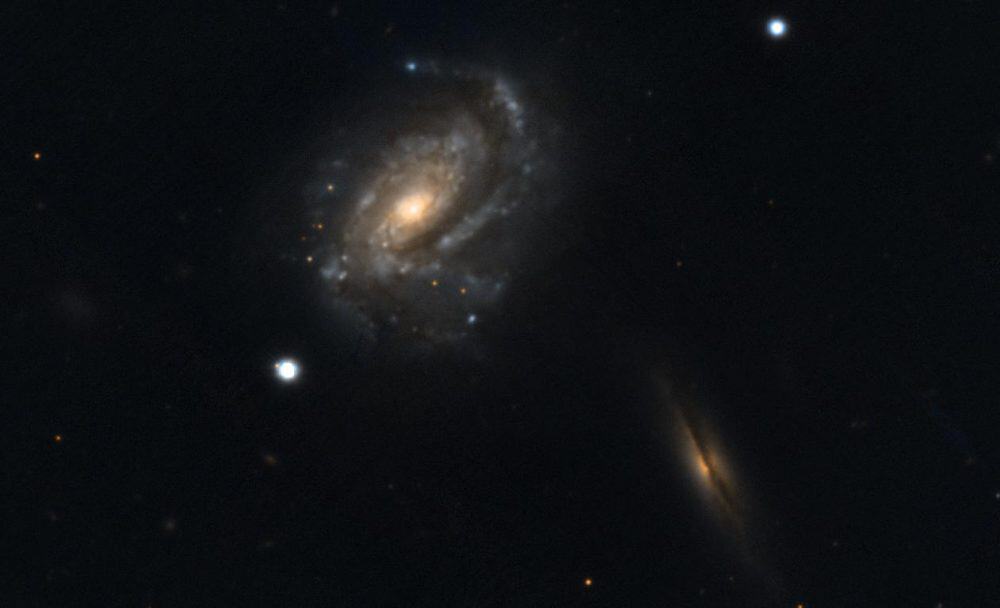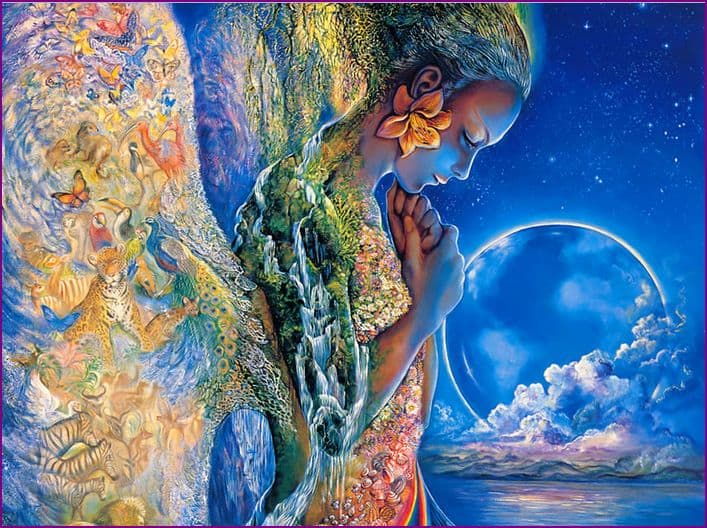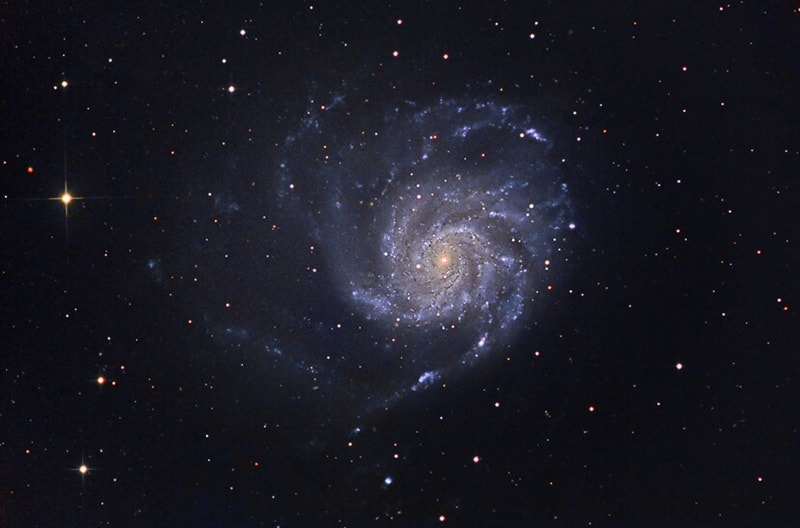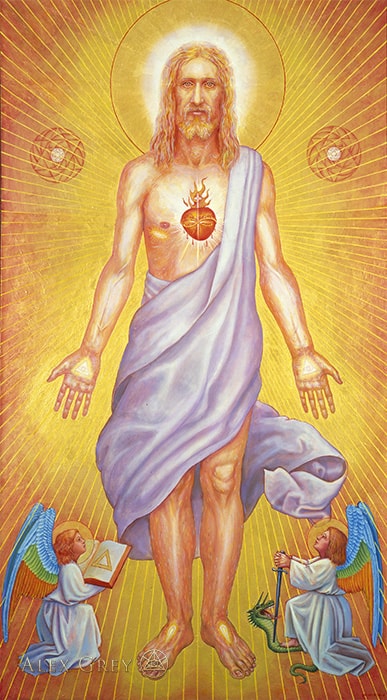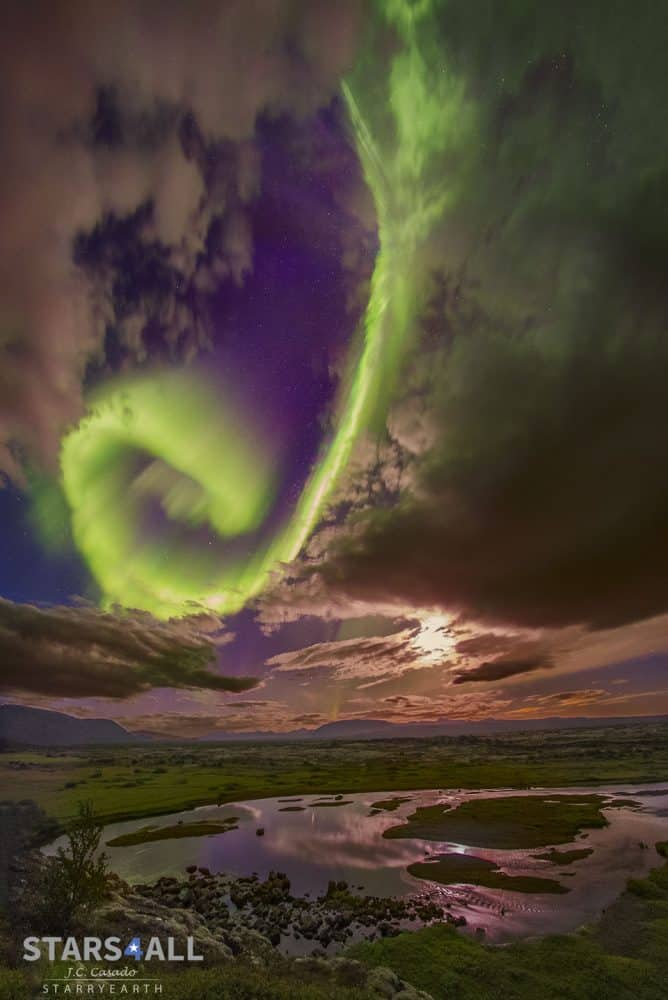Blog
NGC 877 is an intermediate spiral galaxy located in the constellation Aries. It is located at a distance of circa 160 million light years from Earth, which, given its apparent dimensions, means that NGC 877 is about 115,000 light years across. It was discovered by William Herschel on October 14, 1784. It interacts with NGC 876.
NGC 877 features two spiral arms with a grand design pattern and slightly disturbed morphology. When pictured in H-alpha, the arms have numerous knots and appear brighter than the nucleus. The northwest part of the galaxy has higher polarised emission than the rest of the galaxy. A bar appears in radio waves. The nucleus has activity that resembles that of a HII region. The galaxy has been categorised as a luminous infrared galaxy, a category of galaxies associated with high star formation rate. The total infrared luminosity of the galaxy is estimated to be between 1011.04 L☉ and 1011.1 L☉, lying near the threshold to classify a galaxy as luminous infrared. The total star formation rate in NGC 877 is estimated to be between 20 and 53 M☉ per year.
One possible supernova has been observed in NGC 877, SN 2019rn. It was discovered by the robotic sky survey ATLAS on January 12.30, 2019, using a twin 0.5m telescope system. It had apparent magnitude 18.9 on discovery. The supernova was initially classified as a type II supernova with spectroscopic observations by Keck-II, and further spectographic observations categorised it as type IIb, although it could also be a cataclysmic variable or another type of variable star.
NGC 877 forms a pair with the edge-on spiral galaxy NGC 876, which lies 2.1 arcminutes to the southwest. At the distance of NGC 877, this corresponds to a projected distance of 30 kpc.
more...Roy Kelton Orbison (April 23, 1936 – December 6, 1988) was an American singer, songwriter, and musician known for his powerful voice, wide vocal range, impassioned singing style, complex song structures, and dark, emotional ballads. The combination led many critics to describe his music as operatic, nicknaming him “the Caruso of Rock” and “the Big O”. While most male rock-and-roll performers in the 1950s and 1960s projected a defiant masculinity, many of Orbison’s songs instead conveyed vulnerability. During performances, he was known for standing still and solitary and for wearing black clothes to match his dyed jet-black hair and dark sunglasses; all of this lent an air of mystery to his persona.
Born in Texas, Orbison began singing in a rockabilly and country-and-western band in high school. He was signed by Sam Phillips, of Sun Records, in 1956, but his greatest success came with Monument Records. From 1960 to 1966, 22 of his singles reached the Billboard Top 40, and he wrote or co-wrote almost all that rose to the Top 10, including “Only the Lonely” (1960), “Running Scared” (1961), “Crying” (1961), “In Dreams” (1963), and “Oh, Pretty Woman” (1964). Soon afterward, he was struck by a number of personal tragedies while his record sales declined.
In the 1980s, Orbison experienced a resurgence in popularity following the success of several cover versions of his songs. In 1988, he co-founded the Traveling Wilburys, a rock supergroup, with George Harrison, Bob Dylan, Tom Petty, and Jeff Lynne. Orbison died of a heart attack in December 1988 at the age of 52. One month later, Orbison’s song “You Got It” (1989), co-written with Lynne and Petty, was released as a solo single and became his first hit to reach the U.S. Top 10 in nearly 25 years.
Orbison’s honors include inductions into the Rock and Roll Hall of Fame in 1987, the Nashville Songwriters Hall of Fame in the same year, and the Songwriters Hall of Fame in 1989. Rolling Stone placed him at number 37 on their list of the “Greatest Artists of All Time” and number 13 on their list of the “100 Greatest Singers of All Time’. In 2002, Billboard magazine listed Orbison at number 74 in the Top 600 recording artists.
more...Vernice “Bunky” Green (born April 23, 1935) is an American jazz alto saxophonist and educator.
His first big break came when he was hired in New York City by Charles Mingus as a replacement for Jackie McLean in the 1960s. His brief stint with the eccentric bass player made a deep impression. Mingus’ sparing use of notationand his belief that there was no such thing as a wrong note had a lasting influence on Green’s own style.
The next year, Green moved to Chicago, Illinois, where he appeared with several prominent players including Sonny Stitt, Louie Bellson, Andrew Hill, Yusef Lateef, and Ira Sullivan. Originally strongly influenced by Charlie Parker, Green spent a period reassessing his style and studying, emerging with a highly distinctive sound that has deeply influenced a number of younger saxophonists, including Steve Coleman and Greg Osby.
https://www.youtube.com/watch?v=SQURFbCzDZk
more...Charles Edward “Cow Cow” Davenport (April 23, 1894 – December 3, 1955) was an American boogie-woogie and piano blues player as well as a vaudeville entertainer. He also played the organ and sang.
Davenport, who also made recordings under the pseudonyms of Bat The Humming Bird, George Hamilton and The Georgia Grinder, is a member of the Alabama Music Hall of Fame.
He was born in Anniston, Alabama, United States, one of eight children. Davenport started playing the piano at age 12. His father objected strongly to his musical aspirations and sent him to a theological seminary, where he was expelled for playing ragtime.
Davenport’s career began in the 1920s when he joined Banhoof’s Traveling Carnival, a medicine show. His first fame came as accompanist to blues musicians Dora Carr and Ivy Smith. Davenport and Carr performed as a vaudeville act as “Davenport & Co”, and he performed with Smith as the “Chicago Steppers”. He also performed with Tampa Red. Davenport recorded for many record labels, and was a talent scout and artist for Vocalion Records. Davenport suffered a stroke in 1938 and lost movement in his hands. He was washing dishes when he was found by the jazz pianist Art Hodes. Hodes assisted in his rehabilitation and helped him find new recording contracts.
His best-known tune was “Cow Cow Blues”. The “Cow Cow” in the title referred to a train’s cowcatcher. The popularity of the song gave Davenport the nickname “Cow Cow.” In 1953, “Cow Cow Blues” was an influence on the Ahmet Ertegün-written “Mess Around” by Ray Charles,[citation needed] which was Charles’s first step away from his Nat “King” Cole-esque style, and into the style he would employ throughout the 1950s for Atlantic Records.
https://www.youtube.com/watch?v=D_40mGvLL9k
more...
https://www.youtube.com/watch?v=2RG9qBzHHrQ
more...Spiral galaxy M101 is a giant with a diameter on the order of 170,000 light-years. It lies in the constellation Ursa Major the Great Bear some 23 million light-years away. The Pinwheel Galaxy (also known as Messier 101, M101 or NGC 5457) is a face-on spiral galaxy distanced 21 million light-years (six megaparsecs) away from Earth in the constellation Ursa Major. Discovered by Pierre Méchain on March 27, 1781, it was communicated to Charles Messier who verified its position for inclusion in the Messier Catalogue as one of its final entries.
more...Paul Laurence Dunbar Chambers, Jr. (April 22, 1935 – January 4, 1969) was a jazz double bassist. A fixture of rhythm sections during the 1950s and 1960s, his importance in the development of jazz bass can be measured not only by the extent of his work in this short period, but also by his impeccable timekeeping and intonation, and virtuosic improvisations. He was also known for his bowed solos. Chambers recorded about a dozen albums as a leader or co-leader, and as a sideman, notably as the anchor of trumpeter Miles Davis‘s “first great quintet” (1955–63) and with pianist Wynton Kelly (1963–68).
Lorenzo Aitken (22 April 1927 – 17 July 2005), better known by the stage name Laurel Aitken, was an influential Caribbean singer and one of the pioneers of Jamaican ska music. He is often referred to as the “Godfather of Ska”. Born in Cuba of mixed Cuban and Jamaican descent, Aitken and his family settled in Jamaica in 1938. After an early career working for the Jamaican Tourist Board singing mento songs for visitors arriving at Kingston Harbour, he became a popular nightclub entertainer. His first recordings in the late 1950s were mento tunes such as “Nebuchnezer”, “Sweet Chariot” (aka the gospel classic “Swing Low, Sweet Chariot”) and “Baba Kill Me Goat”. Aitken’s 1958 single “Boogie in My Bones”/”Little Sheila” was one of the first records produced by Chris Blackwell and the first Jamaican popular music record to be released in the United Kingdom. Other more Jamaican rhythm and blues orientated singles from this period include “Low Down Dirty Girl” and “More Whisky” both produced by Duke Reid.
https://www.youtube.com/watch?v=kmI6Ml43Wfw
more...Charles Mingus Jr. (April 22, 1922 – January 5, 1979) was an American jazz double bassist, pianist, composer and bandleader. A major proponent of collective improvisation, he is considered to be one of the greatest jazz musicians and composers in history, with a career spanning three decades and collaborations with other jazz legends such as Louis Armstrong, Duke Ellington, Charlie Parker, Dizzy Gillespie, Dannie Richmond, and Herbie Hancock.
Mingus’ compositions continue to be played by contemporary musicians ranging from the repertory bands Mingus Big Band, Mingus Dynasty, and Mingus Orchestra, to the high school students who play the charts and compete in the Charles Mingus High School Competition. In 1993, The Library of Congress acquired Mingus’s collected papers—including scores, sound recordings, correspondence and photos—in what they described as “the most important acquisition of a manuscript collection relating to jazz in the Library’s history”.
Charles Mingus was born in Nogales, Arizona. His father, Charles Mingus Sr., was a sergeant in the U.S. Army. Mingus was largely raised in the Watts area of Los Angeles. His maternal grandfather was a Chinese British subject from Hong Kong, and his maternal grandmother was an African-American from the southern United States. Mingus was the third great-grandson of the family’s founding patriarch who was, by most accounts, a German immigrant. His ancestors included German American, African American, and Native American.
https://www.youtube.com/watch?v=5STaUWmh9bw
more...The beauty is the aurora overhead, here taking the form of great green spiral, seen between picturesque clouds with the bright Moon to the side and stars in the background. The beast is the wave of charged particles that creates the aurora but might, one day, impair civilization. In 1859, following notable auroras seen all across the globe, a pulse of charged particles from a coronal mass ejection (CME) associated with a solar flare impacted Earth’s magnetosphere so forcefully that they created the Carrington Event. A relatively direct path between the Sun and the Earth might have been cleared by a preceding CME. What is sure is that the Carrington Event compressed the Earth’s magnetic field so violently that currents were created in telegraph wires so great that many wires sparked and gave telegraph operators shocks. Were a Carrington-class event to impact the Earth today, speculation holds that damage might occur to global power grids and electronics on a scale never yet experienced. The featured aurora was imaged in 2016 over Thingvallavatn Lake in Iceland, a lake that partly fills a fault that divides Earth’s large Eurasian and North American tectonic plates.
more...Locksley Wellington “Slide” Hampton (born April 21, 1932) is an American jazz trombonist, composer and arranger. Described by critics as a master composer, arranger and uniquely gifted trombone player, Hampton’s career is among the most distinguished in jazz. As his nickname implies, Hampton’s main instrument is slide trombone, but he also occasionally plays tuba and flugelhorn.
At the age of 12, Slide played in his family’s Indianapolis jazz band, The Duke Hampton Band. By 1952, at the age of 20, he was performing at Carnegie Hall with the Lionel Hampton Band. He played with the Buddy Johnson‘s R&Bband from 1955–1956, then became a member of Maynard Ferguson‘s band (1957–1959), where he played and arranged, providing excitement on such popular tunes as “The Fugue,” “Three Little Foxes” and “Slides Derangement.” In 1958, he recorded with trombone masters on the classic release of Melba Liston, “Melba Liston and Her ‘Bones”. As his reputation grew, he soon began working with bands led by Art Blakey, Tadd Dameron in 1969, Barry Harris, Thad Jones, Mel Lewis, and Max Roach, contributing both original compositions and arrangements. In 1962, he formed the Slide Hampton Octet, with horn players Freddie Hubbard, and George Coleman. The band toured the U.S. and Europe and recorded on several labels.
more...James Mundell Lowe (April 21, 1922 – December 2, 2017) was an American jazz guitarist who worked often in radio, television, and film, and as a session musician.
He produced film and TV scores in the 1970s, such as the Billy Jack soundtrack and music for Starsky and Hutch, and worked with André Previn‘s Trio in the 1990s.
The son of a Baptist minister, Lowe grew up on a farm in Shady Grove, Mississippi, near Laurel. He started playing guitar when he was eight years old, with his father and sister acting as his first teachers. When he was thirteen, he began running away from home to play in bands. Occasionally his father would find him, bring him home, and warn him about the dangers of whiskey. At sixteen, Lowe worked in Nashville on the Grand Ole Opry radio program. He was a member of the Jan Savitt orchestra before serving in the military during World War II.
At basic training, he became friends with John Hammond, who organized weekend jam sessions. He performed in an Army dance band while in Guadalcanal. After his discharge, he called Hammond, looking for work, and Hammond sent him to Ray McKinley.[1] He spent two years with McKinley’s big band in New York City. He joined the Benny Goodman orchestra, then worked intermittently for the next few years at Café Society and other clubs in New York.
In 1950, he was hired by NBC as a staff musician. He and Ed Shaughnessy were members of the Today Show band for over ten years. Lowe acted in an episode of the Armstrong Circle Theatre television show that included Walter Matthau and live music by Doc Severinsen.
On the weekends he played jazz, sometimes getting permission from NBC to leave for six-month periods. In the jazz world he played with Jimmy Dorsey and Tommy Dorsey, Bill Evans, Billie Holiday, Red Norvo, Charles Mingus, Charlie Parker, Sauter-Finegan Orchestra, and Lester Young. He composed and arranged for NBC. He was responsible for introducing pianist Bill Evans to record producer Orrin Keepnews, resulting in Evans’s first recordings as a leader.
more...https://www.youtube.com/watch?v=Lf6xw3MLRL4
more...More Posts
- The Cosmos with NGC 772
- Joe Watkins Day
- Jimmy Dawkins Day
- Sonny Terry Day
- World Music with Mahala Rai Banda
- Daily Roots with Pablo Moses
- The Cosmos with NGC 4676
- Gary McFarland Day
- Frank Hewitt Day
- Sonny Criss Day
- World Music with Hassan Erraji
- Daily Roots with Clinton Fearon
- The Cosmos with ESO 97-G13
- Jan Gunnar Hoff Day
- Cyril Blake Day
- World Music with Simo Lagnawi
- Daily Roots with Joe Higgs
- The Cosmos with NGC 4151
- Manfred Mann Day
- Celia Cruz Day
